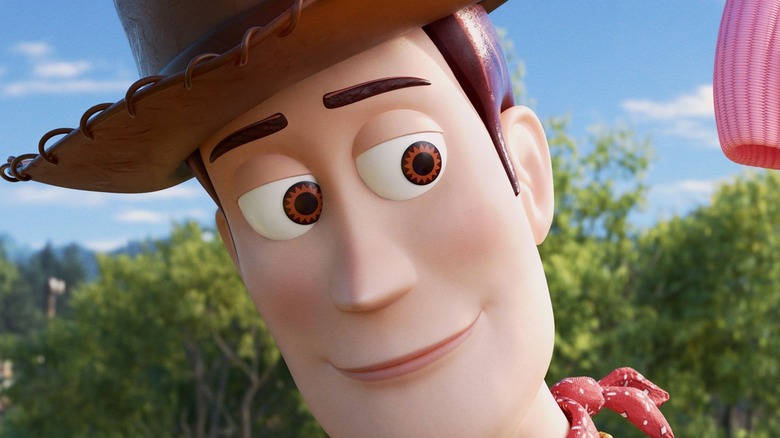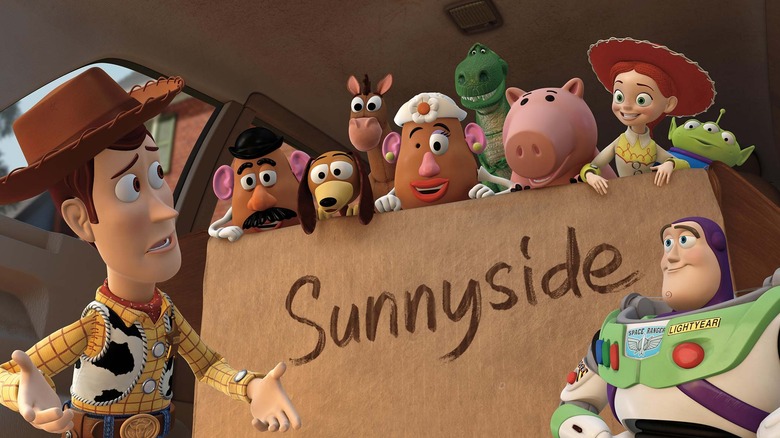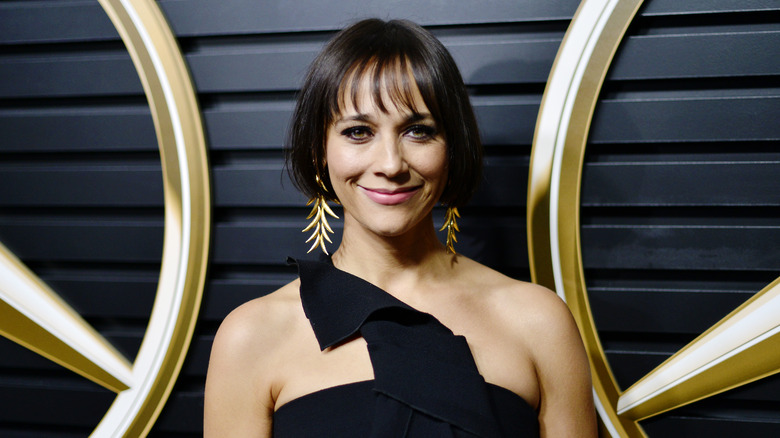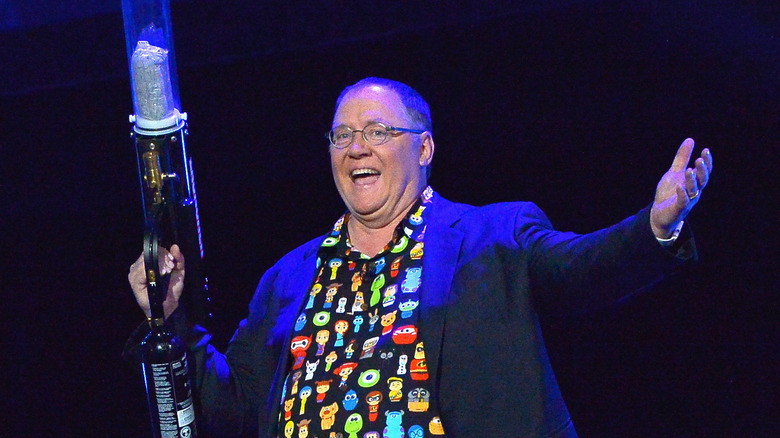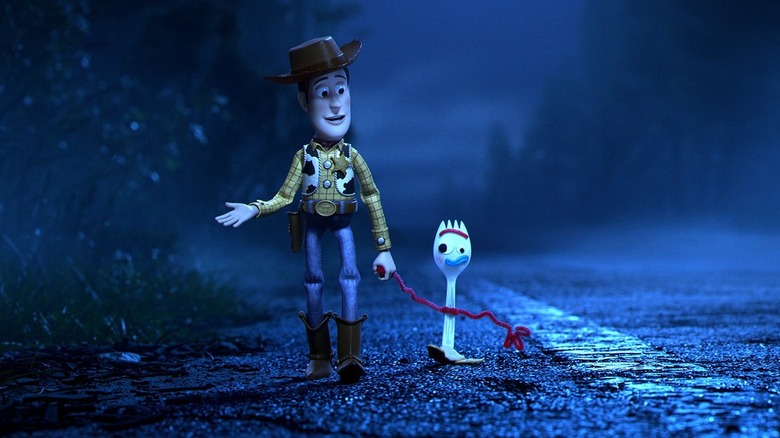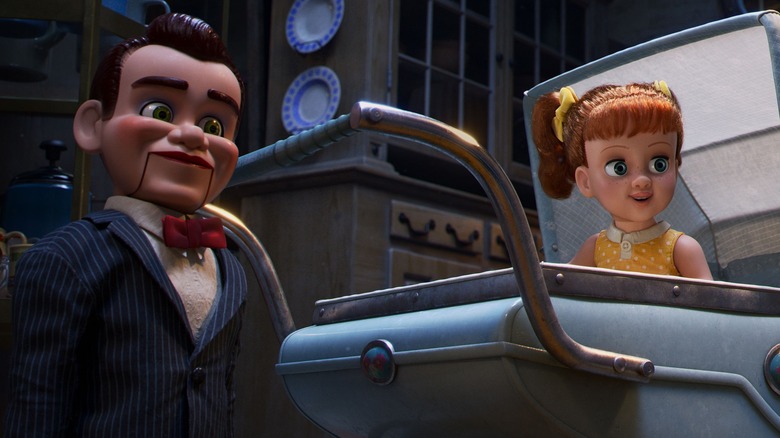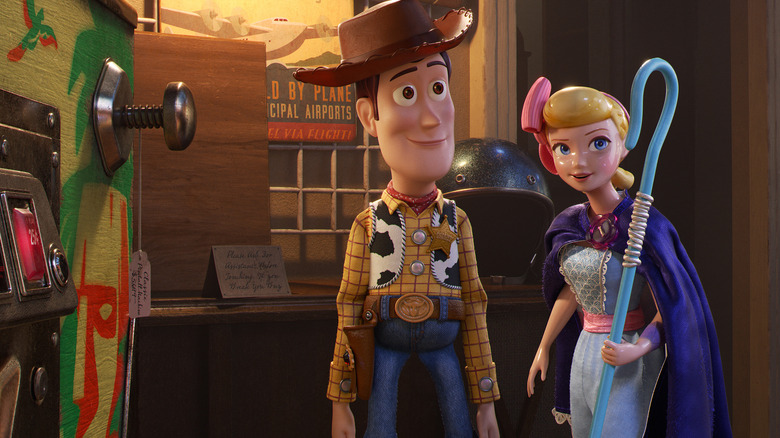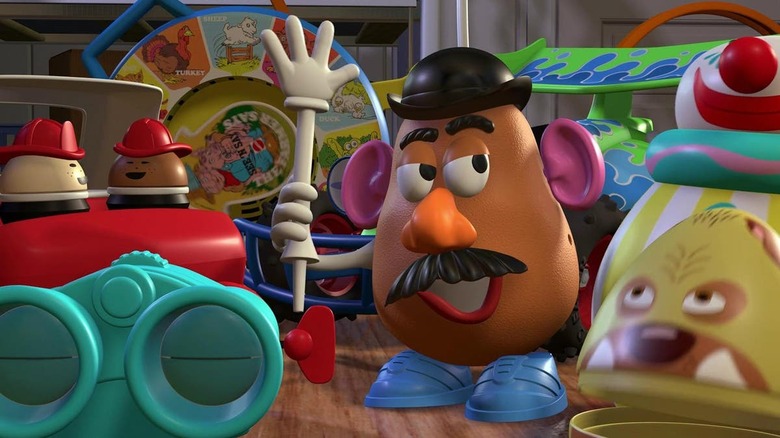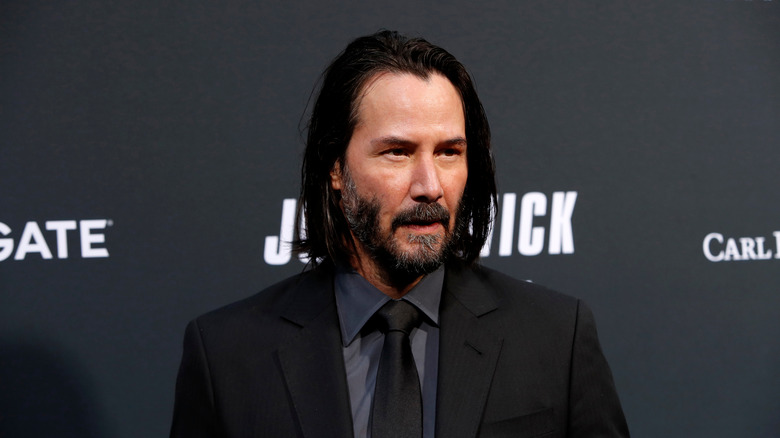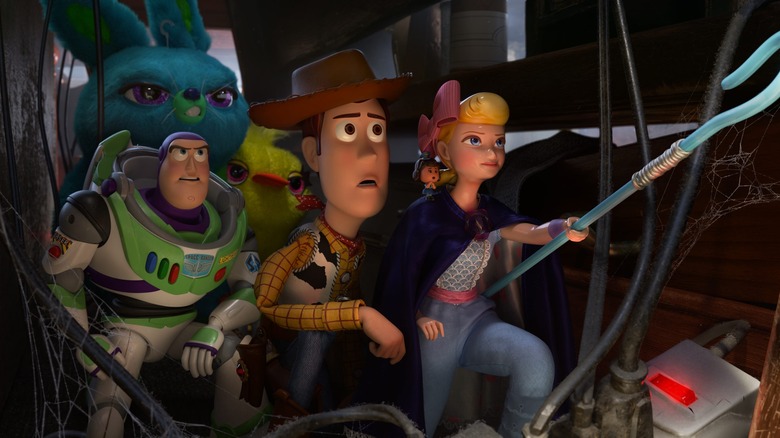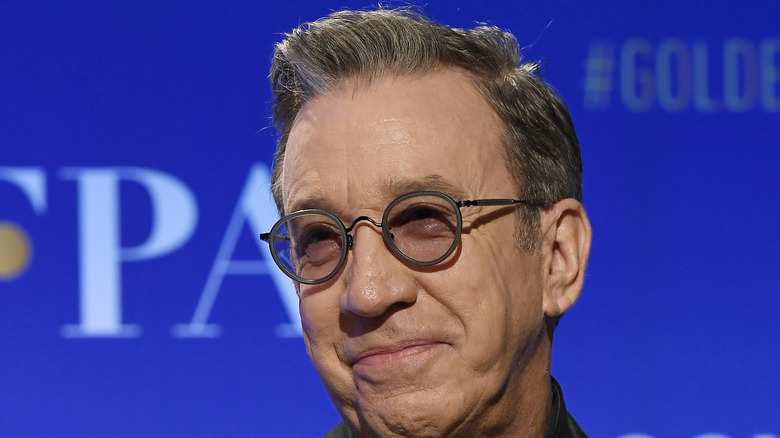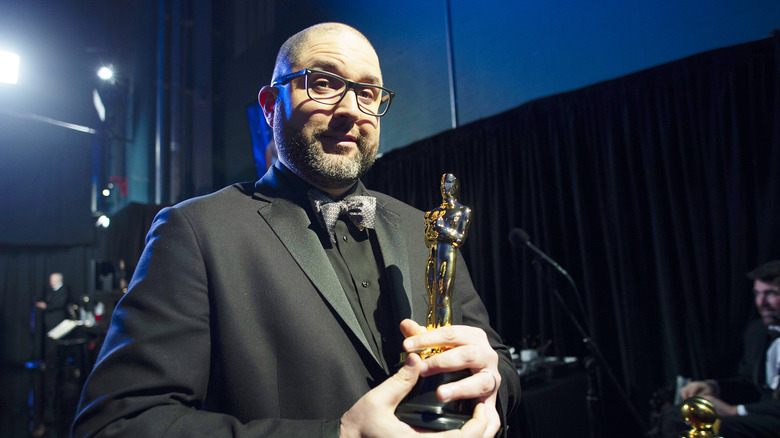What It Was Like Wrapping Up The Toy Story Franchise
It's always tough to say goodbye, even if it's just to a favorite TV show or movie series. But the prospect of bidding adieu to the "Toy Story" saga is especially hard. For many viewers who saw the original as kids, the end of the franchise felt like a nostalgic reminder of the irreversible loss of childhood and the bittersweet passage of time.
It's no easier for its creators. After all, this is the franchise that birthed Pixar as an animation studio. To close out this saga after 24 years of storytelling is to close a chapter on an entire tome of Pixar's history. Of course, in the case of franchise ender "Toy Story 4," that whole emotional experience was paired off with the usual challenges of pulling together any animated blockbuster. "Toy Story 4" experienced many release date delays, changes in its writers and directors, and the usual difficulties of finding new talent to voice fresh faces in the cast.
You might think the melancholy associated with finishing off the "Toy Story" saga might get lost in the production shuffle, but reading the various stories regarding the process behind finish this franchise, it's clear that everyone involved with "Toy Story 4" was all too conscious of what a difficult moment this was. (They may not have known at the time that a Buzz Lightyear spin-off would soon come down the pipeline, though Tim Allen hinted at it). Here's a closer look at what the last days of the "Toy Story" franchise were like.
Toy Story 4 wasn't always meant to be the end
Before "Toy Story 4" was announced, it was widely presumed that the franchise had already wrapped up its experiences with big-screen adventures through the 2010 installment "Toy Story 3." This wasn't just audience speculation; "Toy Story 3" director Lee Unkrich made it apparent that this was the plan.
"Well, we don't have any plans for 'Toy Story 4,'" Unkrich said in May 2010. "I'm flattered that people ask about it — it reminds me how much people love the characters. (But) it was really important to me with this film that we not just create another sequel, that it not just be another appendage coming off of the other two. I really always thought of this as the conclusion to one big story. I feel like we were trying to make one really great four-and-a-half-hour movie. And so as a result I really worked hard to bring an end to the story of Andy and his toys."
Comments like that, combined with years of radio silence on the prospect of another feature-length "Toy Story" movie, made it seem like the series had ridden into the sunset. But the sudden announcement of "Toy Story 4" changed everything. What was once seen as the finale to the "Toy Story" mythos was now the preceding chapter to the true ending to this saga.
The original screenwriters left
When "Toy Story 4" was announced, it was also revealed who would be writing the screenplay for this outing. For the last entry in the series, "Toy Story 3," Pixar had reached out to a screenwriter outside of the company: Michael Arndt, who penned "Little Miss Sunshine." Though he didn't return for "Toy Story 4," Pixar once again turned to outside talent that had worked on live-action independent features rather than family fare.
"Toy Story 4," which took five years to make, was first entrusted to Rashida Jones and Will McCormack, the duo who had penned 2012's "Celeste & Jesse Forever." The duo was set to come up with a script based on an idea conjured up by notable Pixar filmmakers John Lasseter, Pete Docter, Lee Unkrich, and Andrew Stanton. However, the twosome eventually left the title, explaining the reason for their departure in a statement.
"We parted ways because of creative and, more importantly, philosophical differences," Jones and McCormack said. "There is so much talent at Pixar, and we remain enormous fans of their films. However, it is also a culture where women and people of color do not have an equal creative voice." Jones specifically was referencing the fact that Pixar had fired its lone female director in 25 years, Brenda Chapman. Jones felt responsible for holding Pixar accountable for its corporate environment of "deep systemic intolerance." Despite rumors, she denied that it had anything to do with allegations about John Lasseter's inappropriate behavior. Pixar has since made steps in the right direction, though big disparities remain.
Director John Lasseter also departed
When "Toy Story 4" was first announced, it was revealed that John Lasseter would be directing the project. While Lasseter had helmed the first two "Toy Story" movies, he had largely stayed away from directing since 1999 (save for the first two "Cars" features) due to his responsibilities running Pixar Animation Studios and other divisions of Disney. By the summer of 2017, it was announced that Lasseter was stepping down from his role as director of the production. Co-director Josh Cooley subsequently took over as the sole director of "Toy Story 4."
Lasseter later clarified that it was just his other obligations at Disney that kept him away from helming the film. "I always felt like I need to keep directing, and that's why I decided to do 'Toy Story 4' initially," Lasseter said. "But I oversee three studios and I think I counted 24 feature films I'm overseeing, and it was not really practical, to be blunt. But also what made it easy was Josh Cooley was amazing; wait until you see it — he is so good. And it was time to let go of the bike and let him ride, and he's doing a great job. It's really fantastic." Lasseter made no reference to the sexual harassment scandal that later resulted in his departure from Pixar altogether.
With this shuffle regarding directors sorted out, the final "Toy Story" adventure could continue on its path to movie theaters.
Stephany Folsom revamped the screenplay
At the start of 2018, "Toy Story 4" was in a difficult position; both its original screenwriters and its director had left. At this point, something drastic needed to happen. Enter Stephany Folsom, the screenwriter hired to produce a new script for the final "Toy Story" movie.
Actor Annie Potts, the voice behind Bo Beep, would later reveal just how drastically Folsom upended the earlier drafts of "Toy Story 4." "['Toy Story 4'] was supposed to come out this year and then they threw out three-quarters of it and rewrote," Potts explained. "Usually, it takes, from start to finish, two years. But because they threw most of it in the bin and started over [my time on the project has] been extended a little bit. I've done a lot of work on it."
For her part, Folsom mentioned the biggest hurdle in penning this last "Toy Story" adventure was adjusting to the world of animation. "When you're going into animation, it's very different than being on a live-action set," Folsom explained. "On set, you're sort of stuck with what happens there unless there's a reshoot. With animation, you can put anything in the frame and re-do it as many times as you want, which is both liberating and maddening."
Pixar explored new locations
Each new "Toy Story" movie brought moviegoers to new locations for the adventures of Woody, Buzz, and all their friends. Whether it's Al's Toy Barn in "Toy Story 2" or Sunnyside Daycare in "Toy Story 3," you can be sure that these animated adventures won't just rely on familiar locales. Director Josh Cooley was well aware of this as he took the reins on this concluding installment in the saga.
"Okay, every 'Toy Story' movie has new characters and new locations, and that's what, to me, makes it fun," Cooley explained. "It's something you've seen before, but never from [the toys'] point of view, so that's why I was excited about the antique store. Because that's the place you see old toys, but what would that be like for them? Also, the carnival, because we realized carnival toys had the worst existence, out of any toy ... anything that was new, immediately it was like, 'We've got to go down that path, and see if anything comes out of that.'"
With this emphasis on new locations firmly in place, "Toy Story 4" could be a fitting continuation of its predecessors.
Annie Potts returned to the fold
For "Toy Story 4," a principal character from the first two movies was brought back into the fray. Bo Peep, who was wholly absent from "Toy Story 3," not only returned for "Toy Story 4," but also became a principal character who developed her own life beyond Andy's playroom and her beau, Woody. (She also traded her massive polka-dot skirt and petticoat for a more practical jumpsuit.)
Per Annie Potts, the concept of Peep returning for "Toy Story 4" wasn't just randomly drawn up for this sequel. Being excluded from "Toy Story 3" "hurt [her] feelings a little bit," Potts explained. "But John [Lasseter] explained to me the reason was because they were saving me for '4.'" She also observed that this last "Toy Story" movie offered up the unique opportunity for her to actually record with her co-stars. "Most of it is with Tom [Hanks, who voices Woody]. I've never done any animation before where you got to work with the other actors. [Normally it's] just a single voice at a time. But because of the nature of what we're doing, [we had] Tom and me together."
Pixar reconstituted Don Rickles
The crew of "Toy Story 4" were faced with a daunting challenge. Since the release of "Toy Story 3," Don Rickles, the voice of Mr. Potato Head, had passed away. While the character was already set to be a part of "Toy Story 4," something would have to be done to make sure Rickles and his character could still be a major part of the proceedings. The solution? Unused vocal tracks.
As Josh Cooley told it, after Rickles died, " ... his family contacted [Pixar] and asked if there was any way that we could create a performance using the recordings that we had ... Unfortunately we did not get a chance to record him for the film. But we went through, jeez, 25 years of everything we didn't use for 'Toy Story 1,' '2,' '3,' the theme parks, the ice capades, the video games — everything that he's recorded for Mr. Potato Head. And we were able to do that." The "Toy Story" saga thus wrapped up with one of its most beloved supporting players in tow.
New actors joined the Toy Story family
A whole slew of familiar faces appeared in "Toy Story 4," but this concluding installment also brought in a collection of newbie characters. The "Toy Story" universe was always expanding, even as it was ending. Among the numerous new characters were the paranoid spork Forky, a pair of stuffed animals named Bunny and Ducky that could be won at a carnival game, and a principal antagonist named Gabby Gabby.
Also in the roster of fresh faces was Duke Caboom, voiced by Keanu Reeves. Reeves was able to inject his own personality into this stuntman character. "I got a call which was really cool out the blue from the lovely people at Pixar and the creators of this number, this edition, or continuation of the story," Reeves reflected. "They pitched the character to me and then we spoke and they allowed me to kind of riff on it." The result was a distinctive rendering of a plastic daredevil, which offered up an original entry in an already rich catalog of memorable side characters.
The release date was repeatedly adjusted
When "Toy Story 4" was first announced in November 2014, it was given a June 2017 release date. The first two entries in the franchise had been released around Thanksgiving, but Pixar seemed to like the results of releasing "Toy Story 3" in June 2010.
While "Toy Story 4" always remained a June tentpole, the year in which it was released was constantly in flux. Less than a year after settling on June 2017, "Toy Story 4" was delayed to June 2018, with "Cars 3" taking over its initial release date. At the time, this shift was attributed to merely making space for "Cars 3." However, the hunt for a place on the calendar was not finished.
In October 2016, it was revealed that "Incredibles 2" had moved along far enough in production to warrant an earlier release date. This meant that "Toy Story 4" was moved up to the June 2019 domain previously occupied by "Incredibles 2." In the end, though, this barrage of postponements was advantageous for "Toy Story 4." Given the production hiccups, a delay was inevitable even if "Toy Story 4" hadn't shuffled its release date around for other Pixar sequels.
Tim Allen got emotional about recording his final lines
Tim Allen, the voice of the indomitable Buzz Lightyear, has been with the "Toy Story" franchise from the get-go. It's no surprise that he had a particularly profound reaction to voicing the character in the final installment of the saga. In fact, Allen was left in tears by the end of his voice recording sessions.
"I gotta resist getting emotional. I don't want to give it away, but this is an incredibly great story," Allen recalled. "It is so emotional, it's so funny, it's so big, the idea they've come up with, I'm startled. I couldn't even get through the last scene."
Even when pressed for more details, Allen refused to give away spoilers for the then-unreleased final chapter. It's clear Allen values his character as much as any fan.
Director Josh Cooley felt the pressure
Directing your first feature-length movie is always a daunting task, but it's especially so when you have to helm a film meant to wrap up a series as meaningful as "Toy Story." Director Josh Cooley was well aware of this challenge in tackling "Toy Story 4" as his directorial debut. His entire creative vision for the project was to live up to the quality of previous entries.
"I was absolutely thrilled to take ['Toy Story 4'] on, and absolutely terrified at the same time," Cooley explained. "Because it's 'Toy Story,' and there's so much love for it out there. I adore it, too, so I wanted to make sure that it was a story that was worth telling, and that it wasn't just another adventure ... I kept saying, 'We need to earn the title of 'Toy Story 4.'"
Taking on this task also proved to be an educational experience for the filmmaker. "I learned a lot about leadership," Cooley said about his biggest takeaways from helming the last "Toy Story" movie. "I learned a lot about just the process, in general. I came up through the story department, but I never worked with the technical teams before, so just seeing how they do what they do was incredible." Despite all the production woes and the shadow of scandal, Cooley's hard work paid off: The film was well-reviewed upon its release, holding a certified fresh 97% rating on Rotten Tomatoes and winning an Oscar for Best Animated Feature.
